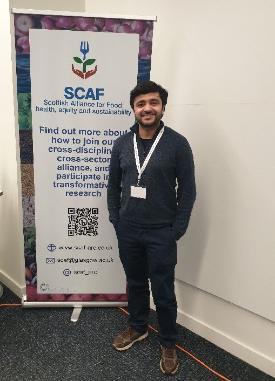AGENTs & SCAF Collaborative Workshop | March 2024
Published: 12 April 2024
A joint workshop on nutrition sensing and ageing: Two days packed with insight, innovation and networking
AGENTs & SCAF Collaborative Workshop
by Dr Santosh Gaihre, Lecturer in Global Health | School of Medicine, Medical Sciences and Nutrition (SMMSN) | University of Aberdeen

Last month, I had an opportunity of attending a collaborative workshop at the University of Glasgow hosted by the Scottish Alliance for Food (SCAF) in collaboration with the AGEing and Nutrient Sensing (AGENTs) Network. Before delving into my reflections on the event, I would like to extend my heartfelt gratitude to the dedicated team at SCAF in Glasgow, with special acknowledgment to Professor Emilie Combet, who is my academic mentor through the European Nutrition Leadership Platform (ENLP).
Day 1 offered a wide variety of talks, group discussions and networking opportunities. After a welcome and introduction to AGENTs and SCAF by Professor Gary Frost from Imperial College London and Professor Emilie Combet from University of Glasgow, the participants were divided into two groups. Early career researchers (ECR) joined a bespoke ECR Research Culture workshop, whilst more senior researchers shared research interests while reviewing network’s ongoing activities and exploring collaborative research opportunities. The emphasis of the group discussion, "Should nutrient sensing aging research focus on making an impact on life span, health span, or both?" was very stimulating and thought-provoking.
After the lunch break, I attended the ECR-led session The Science of Studying Nutrient Sensing, which showcased a variety of engaging presentations on topics such as healthy dietary patterns, clinical nutrition, bioinformatics, and cell signalling. Despite most presentations focusing on biomedical laboratory research—a field beyond my core research interests—the content was nonetheless stimulating, offering insights into the complexities of nutrient sensing research and highlighting the potential for interdisciplinary collaboration. The day ended with a drinks reception and a quiz followed by a networking dinner, providing ample and enjoyable opportunities for informal interactions and discussions.
Day 2 was another busy day with a review of the AGENTs Network, updates on current projects, and an inspirational session with guest speakers chaired by Professor Emilie Combet from SCAF. The AGENTs network review discussion led by Professor Gary Frost focused on “How do we enhance and extend our science?”. The workshop discussed the need to extend network efforts and bring new people in, focusing on interdisciplinary collaboration in nutrition and ageing). This was an opportunity for all to share about the perils and opportunities linked to interdisciplinary research.
A timely response to the unsolved question raised during group discussion: “how and who should be included in future interdisciplinary collaboration to ensure meaningful impact of the nutrient-sensing research” was complemented by the guest lectures. The first guest speaker, Professor Helen Minnis’s talk on “Healthspan and Bio-exposome: Interdisciplinary approaches to explore Health span and the Exposome”was very poignant and thought-provoking. Prof Minnis shared her experience of involving scientists from diverse backgrounds on the case study-based bio-exposome project. She highlighted both the challenges and advantages of their interdisciplinary project, stating ‘no-one knows what anyone else is talking about at the beginning; everyone has to slow down and explain things in plain English or with diagrams’. But after some time …. ‘People start to get excited when they see links... after that …. really good ideas start to emerge because of the cross-pollination of interdisciplinary scientific views’. She was relating this with Frans Johansson’s The Medici Effect (2006)- “when disparate ideas collide at the intersection of disciplines and create something new”. Helen’s lecture left a lasting impression on me, and I noticed how her talk inspired all the workshop participants, particularly ECRs, to appreciate the significance of engaging in interdisciplinary research approaches. Dr Lindsay Middleton’sguest lecture on “Arts and Humanities in food and nutrition research” further enriched this session. Lindsay shared her experience of how diverse disciplines, with her practical experience of artistic and humanistic perspectives with scientific research can converge to shed light on food and nutrition research. Together, these two guest lectures provided a comprehensive understanding of the value and potential of interdisciplinary approaches in research, inspiring workshop participants to embrace a broader spectrum of methodologies and viewpoints in their academic research work.
Overall, it was a great experience to participate, network and listen to what other colleagues in SCAF and AGENTs had to say. The two-day event was full of learning about SCAF and AGENTs’ ongoing work, future collaborative research opportunities, thought-provoking guest lectures and networking with academic researchers in biomedical sciences, food, nutrition, and health, fostering a multidisciplinary exchange of knowledge and experiences. I particularly enjoyed the strong focus of the workshop on the capacity strengthening of ECRs and the importance of interdisciplinary work in the design and delivery of nutrient sensing research.
This blog is authored by a SCAF member and may not reflect the views and opinions of the wider SCAF membership.
First published: 12 April 2024
<< Blog

